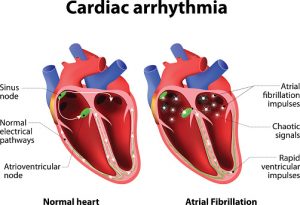
Accounting for over 600,000 deaths per year, sudden cardiac death occurs when the heart stops functioning due to a type of arrhythmia called ventricular fibrillation. You may have also heard of another type of arrhythmia (actually, the most common one), atrial fibrillation, which may lead to stroke in the most severe cases.
Of course, any effort to prevent arrhythmias and strengthen your heart will benefit your health. Eating a heart-healthy diet, keeping your stress levels at bay, quitting smoking, staying active, and controlling other health conditions such as blood pressure and diabetes are all commons strategies to protect yourself from heart troubles. (This secret makes your heart stronger.)
Unfortunately, heart arrhythmias often arise as the aftermath of another heart condition, like coronary artery disease or congenital heart disease, especially after surgery. Currently, postoperative care aiming to prevent the development of heart arrhythmias—atrial fibrillation in particular—involves lifestyle adjustments (as mentioned above), medications, and cardiac ablation. The latter is a surgical procedure to restore normal heart beat. While it is often more successful than medication, it is invasive and costly, and often more than one treatment is required to resolve the arrhythmia.
As arrhythmia is a common and potentially deadly condition, the medical community is constantly on the lookout for novel treatments. There’s one still in the early development stages and it is currently used only in cases of major cardiac surgery, yet it shows promise for future treatments nonetheless.
Botox used to treat atrial fibrillation
A superstar of the beauty industry, Botox has found a wide application in the medicinal industry as well. Most notably, its ability to relax the muscles—commonly used to smooth out wrinkles—has been tapped into to treat urinary incontinence. Botox helps reduce the number of incontinence episodes by relaxing the overactive bladder muscles. Other medical applications include treatment for excessive sweating, muscle spasms, and vocal tremors. And now, researchers are using Botox to treat atrial fibrillation. (All-in-one anti-aging formula gives you quick results.)
A small study involved 60 atrial fibrillation patients all undergoing coronary artery bypass grafting, a surgery to improve blood flow to the heart. Half of the subjects received Botox injections into the fat around their heart during the procedure and the other half were injected with saline solution (placebo group). In a one-month follow-up, seven percent of the patients in the Botox group developed atrial fibrillation compared to 30 percent in the placebo group. Over the following 11 months, 27 percent of placebo patients experienced recurring episodes of arrhythmia compared to none in the Botox group.
Contrary to the researchers’ expectations that Botox’s effects would diminish within three to six months, the effects remained beyond that time frame.
While this was a small clinical study and further research and more trials are required in order to make Botox injections a commonplace treatment for atrial fibrillation, it gives hope for a less invasive and more effective approach to restoring a normal heartbeat and preventing arrhythmia episodes in cardiac patients.
Related: Heartburn or heart attack? Here’s the difference